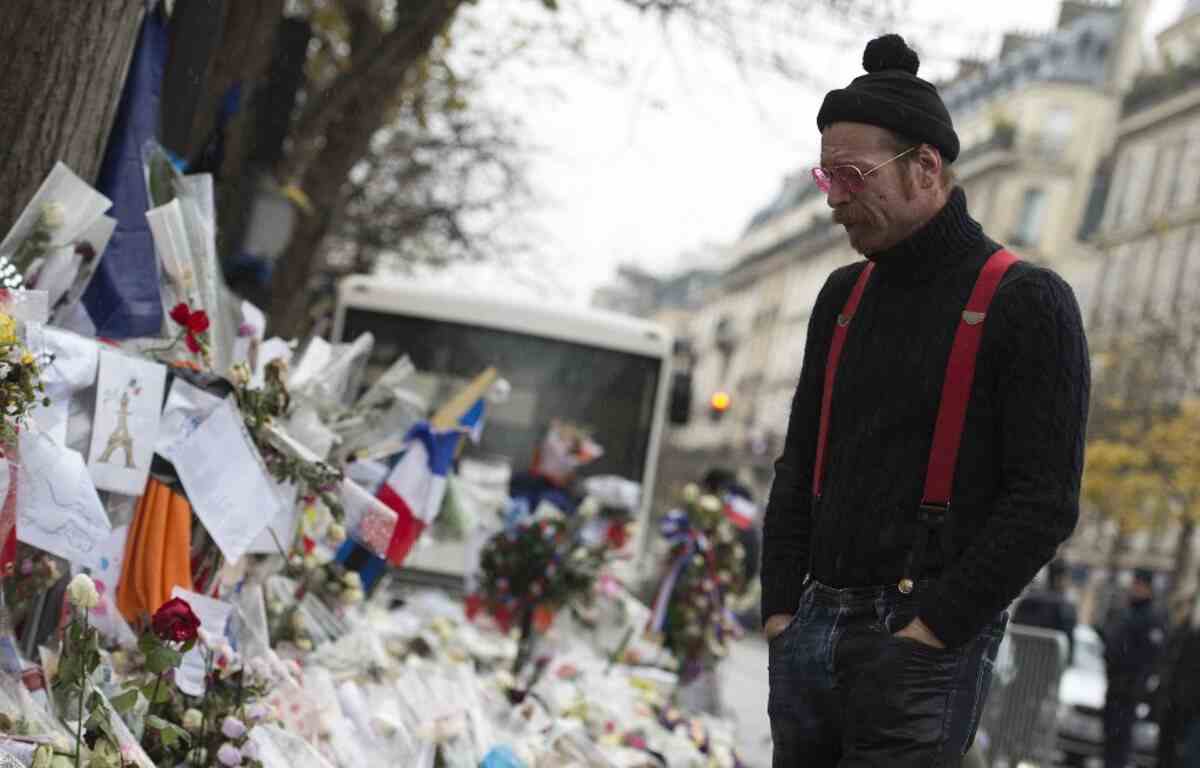At the specially composed Court of Assizes of Paris,
For the first time since the start of the November 13 trial, the Assize Court was transported to the Bataclan stage. For weeks last fall, the choral story of the victims of this macabre behind closed doors enabled the magistrates and the defendants to measure the extent of the horror experienced that evening by the thousands of rock fans gathered in this concert hall. There were the violent words of the terrorists perceived by those who had placed themselves on the balconies, the deaf and repeated noises of the gusts in the pit and the echo of the wounded affected a few meters from the emergency exits.
This Tuesday, May 17, two surviving members of the group Eagles of death metal (EODM) who was performing that evening described to the court what they saw and experienced from the top of the platform which overlooked the room. Both dressed in black suits, former EODM guitarist Eden Galindo and singer Jesse Hugues spoke of the looks of incomprehension exchanged with the crowd at the start of the terrorist attack. Modest and very moved, they, like their fans before them, recounted the terror, their “broken” life and their intimate struggles not to give up the stage and music.
“I remember the public watching me”
After a week of interruption due to the Covid-19 contamination of one of the accused, the benches of the civil parties filled up again. Among them, a majority of relatives of victims of the Bataclan attack and survivors had made the trip to hear these two atypical witnesses from the United States. Crushed by the solemnity of the moment and the emotional charge, the two musicians appeared at the antipodes of the extroverted and restless characters that they had built up over the course of their careers. Eden Galindo, the former guitarist of the formation, is the first to have advanced in front of the magistrates. Without note and all in sobriety, the fifty-year-old plunged back into the beginnings of the concert: “It was a great show, one of the best of the tour. Everything was going well, everyone was dancing.
When the first shots of the terrorists ring out, the musician first thinks of an “explosion of the sound system”. He walks to the front of the stage and sees his friend Jesse Hughes running in his direction. “ What the fuck is going on? “, loose, incredulous, the guitarist. The singer, who grew up in the Coachella Valley, assures him that he immediately recognized the sound of bullets: “Coming from a desert region in California, the sound of gunfire is very familiar to me”. Posted a few meters from the first spectators gathered at the foot of the stage, Eden Galindo has not forgotten the confusion and fear that seized them: “I remember the public watching me. There were so many people, they couldn’t move, ”he breathes.
The shootings, the panic and the flight
The following echoes the hundreds of testimonies heard so far by the court. “They all started shooting at the same time and ran out of bullets at the same time. They were reloading and shooting, ”describes the former guitarist. Gathered at the back of the stage, Eden Galindo and Jesse Hugues rush upstairs in search of the singer’s girlfriend, then untraceable. Red tie on black shirt and hair tied in a ponytail, the leader of the group says he “felt death approaching”. Panicked, he finally manages to find his spouse and rushes with her and Eden outside the room. “An angel named Arthur put us in a taxi and sent us to a police station,” continues the singer with the red bacchantes.
“We found people who were at the concert. Some were covered in blood. We waited there for a long time and we didn’t know if all the members of the group were alive or dead,” recalls the former American guitarist. Worried about seeing his memories “erode” over time, Jesse Hughes called everything down in writing to try to deliver the most accurate testimony possible to the court. Of this scene at the police station, however, nothing remains apart from the explosion of a call. “It was there that we learned that Nick Alexander and our tour manager had been killed”, specifies Eden Galindo.
“You can’t kill rock’n’roll”
While restrained, the former Eagles guitarist spoke of the scars left by that night: “When I got home, I felt like I was broken. I couldn’t do what normal people do anymore. I was no longer the same. I went to therapy but what really helped me was to go back to Europe and finish our tour”. The group had indeed returned to France for a cathartic concert a few months after the attack. Jesse Hugues, has just touched on the trauma caused by this evening. “The events that occurred on November 13, 2015 changed my life forever,” he admitted, referring to a permanent “nervousness” that has plagued him since and the fear of going back on stage that he tried to overcome. overcome.
In a fiery statement to the “people of France” and to Paris, the singer claims to have “kept something very beautiful” from this “tragedy” where ninety of his “friends” died. “What they decided to do that night was to silence the music. But they failed. Evil did not win”. As a final tribute to the dead killed for their love of rock and “joie de vivre”, Jesse Hughes concluded his testimony by quoting heavy metal icon, Ozzy Osbourne: “You can’t kill Rock’n’roll “. To see him hugging the civil parties for a long time at the end of his hearing, his eyes and face reddened, it is however the title of a flagship album of the group released in 2004 that comes to mind. “Peace, Love, Death metal”.

